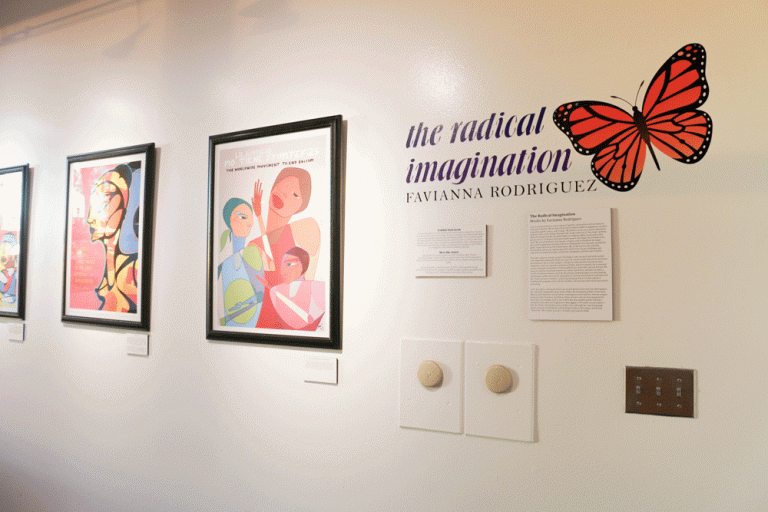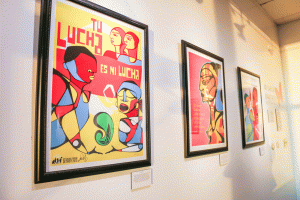
Rebecca Lauffenburger
Staff Writer
Activist and artist Favianna Rodriguez visited the University of California, Santa Barbara on Jan. 24, where she delivered an impassioned talk in accompaniment with her artwork, which is currently on display at the MultiCultural Center.
Rodriguez self identifies as queer and Latina and it’s her ties to these communities that inform her art and activism, which she uses to empower the marginalized and often ignored communities that she holds so dear.
The daughter of Peruvian immigrants, Rodriguez experienced firsthand the kind of anti-Latinx racism that ran rampant in Fruitvale, a predominantly Latinx neighborhood of East Oakland. She recalls underfunded schools, abandoned youth, and the way an entire population was essentially shoved under the rug. Representation matters, and the injustice she saw daily, along with the lack of positive representation of the women of color who made up her community, prompted her to act.
As she continued to develop her artistic skills, her activist side began to flourish as well. At only 15, Rodriguez began organizing. She led protests and staged walkouts at her school, filling the silence with her voice, prompting others to do the same. While attending the University of California, Berkeley she fell in love with printmaking, and hasn’t turned back since. At 20, she decided to withdraw from school in order to pursue what would become an extensive career in art-fueled activism through the creation of political posters.
Despite the heaviness of the issues she seeks to illuminate, such as feminism, immigration, economic inequality, and the eff ects of globalization, she chooses to tackle these problems with a kind of rare, fierce optimism. Her posters are as bold, vibrant, and unapologetic as the artist behind them. With pieces such as “Migration is Beautiful,” “Tu Lucha” (Your Struggle), and “We Are Building the World We Need,” she utilizes what she refers to as the “radical imagination” to portray the unrelenting love that is found in broken communities .
ects of globalization, she chooses to tackle these problems with a kind of rare, fierce optimism. Her posters are as bold, vibrant, and unapologetic as the artist behind them. With pieces such as “Migration is Beautiful,” “Tu Lucha” (Your Struggle), and “We Are Building the World We Need,” she utilizes what she refers to as the “radical imagination” to portray the unrelenting love that is found in broken communities .
“We Are Building the World We Need” depicts people across generations physically rebuilding a city from the ground up. The wings of a butterfly, a common motif found in her work, sprout from the back of a central figure in a symbol of strength and freedom. Along the bottom, bold-yellow text reads, “We organize. We grow. We vote.” It’s a remarkably powerful statement on human resilience, and the power communities have to make informed decisions, and take their lives into their own hands.
One of my personal favorites, entitled “I’m a Slut,” speaks magnitudes about a social ill more prevalent than ever in today’s political climate. The poster displays a woman with bold, overstated features staring straight ahead, demanding the attention of all who see her.
The large, bold font covering most of the poster reads “I’m a slut. I vote. So does everyone I sleep with. And you’re about to be more fucked than I am.” Along the bottom in fine print are the words “Keep ur government off my pussy.” Off all the pieces lining the wall of the exhibit, this one is by far the most eye-catching. It’s a perfect example of the kind of quiet anger, which seeks to both empower and intimidate, found throughout her work.
Her most iconic and well-known poster is undoubtedly “Migration is beautiful.” Bright yellows and soft red and blue hues shade the faces, hidden within the outspread wings of a butterfly. Beneath it is the phrase “migration is beautiful.” Simple words, but they communicate a powerful message that’s more relevant than ever. Rodriguez describes the butterfly as representing the right of people to move freely and to seek survival, a sentiment that resonates strongly with Rodriguez, considering her roots.
Among the many active political activists who utilize art to fight injustice, Favianna Rodriguez stands out as a beacon of light. Her work is a rare instance of love and optimism in the face of injustice. While her posters send an unmistakable message to both the oppressor and the oppressed, she seems to pay no mind to those who would oppose her cause. Instead, she focuses on empowering disadvantaged communities, rather than fueling what has become a rampant culture of hate with incendiary remarks. Rodriguez approaches activism in what I would describe as the “right” way, if there is one.
Her people-centric work speaks on both a personal and global level, as she chooses to address worldwide issues through the display of dynamic figures always in motion, whether singing, rebuilding, or creating. Every work of art is in some way a self-portrait, and if Favianna Rodriguez’s work is reflective of anything, it’s that her undying spirit has the capacity to both revolutionize and heal.










